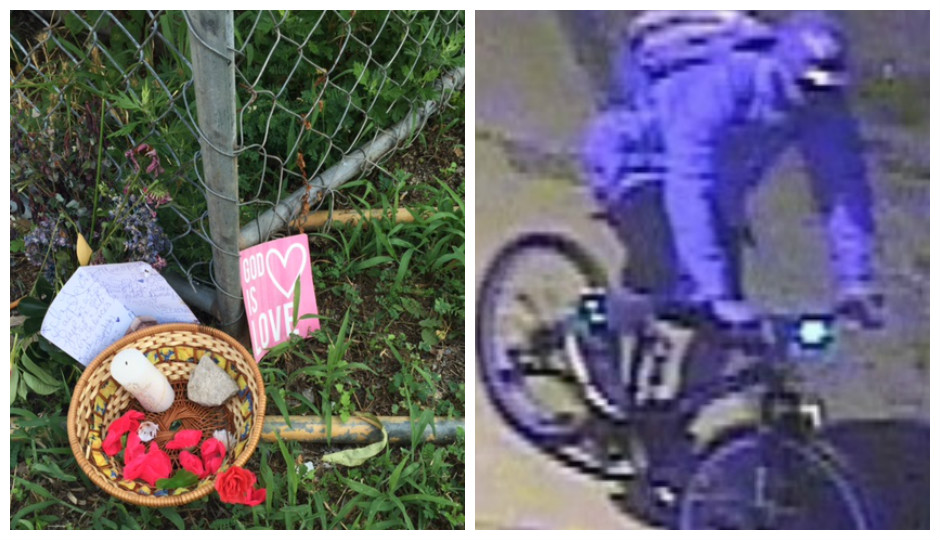Kensington Looks for Hope After Brutal Attacks on Prostitutes

Surveillance footage of suspect wanted for a July 12th sexual assault and attempted murder in Kensington. (Philadelphia Police)
A tiny pink sign sits on the ground at the edge of an empty lot in Kensington, calling out a reassuring message from the dirt and the grass: “GOD IS LOVE.” A wisp of yellow crime scene tape intrudes on that thought, drooping in the humid air from a cyclone fence. This is where a madman butchered Rickie Morgan.
The 35-year-old woman was bludgeoned with a brick and fatally stabbed late Saturday on Cumberland Street near Jasper. She tried to escape, running naked for a block until she collapsed from her injuries. The scene was every bit as gruesome as it sounds. “She was bloody from head to toe,” a police captain told NBC 10 that night.
Morgan was a prostitute. She was also a mother, according to her friends, and an avid reader who liked to talk about theology and the nature of the universe—the way life worked, or didn’t. Those who were close to her will gather for a vigil at 2 p.m. today in Kensington. They’ll mourn, but they’ll also be on high alert. Investigators believe the man who killed Morgan might have also been involved in other recent violent attacks of prostitutes in the area.
The specter of a cold-blooded predator preying on women in the shadows of desolate alleys and street corners takes you back to the bad old days of November and December of 2010, when the city was haunted by the Kensington Strangler. That serial killer turned out to be a 23-year-old named Antonio Rodriguez, who ended up with three life sentences for murdering and raping three prostitutes, and posing their corpses in what amounted to a revolting calling card.
Reporters who flocked to Kensington Avenue during Rodriguez’s killing spree encountered women who could easily recall numerous “bad dates” that ended with them getting beaten, raped or robbed, the experiences blurring together in a fog of addiction and endless trauma. “They’re so traumatized that their brains are unplugged,” Mary Anne Layden, the director of sexual trauma and psychopathology at the Center for Cognitive Therapy at the University of Pennsylvania, told me back then. “It’s like being in a combat zone, and the enemy’s firing, but your mind is at home.”
Morgan’s slaying has rattled her friends. “We had a conversation at [a group meeting] the other day about how death and murder and violence should never be the norm,” says Kathryn Horan, the longtime director of the Thea Bowman Women’s Center. “They’re constantly surrounded with violence, even violent language. They become numb to it. Sometimes it takes something this public, this horrific, to get people to realize this isn’t okay.”
The center is situated on Kensington Avenue a few blocks from Somerset, which has long been a hub for prostitution. It opens its door at 10 in the morning, offering anyone who identifies as a woman a place to get a shower, do laundry, and get on a computer to look for housing. Group meetings fill up the afternoons, focusing on recovery and self-esteem and reminding the women their lives have value. Earlier this week, Morgan was the main topic during an emotional discussion session among women who walk the same thin line between life and death every night.
Horan says Morgan had been a fixture at the center for much of the last two years. Word of her murder spread quickly through the neighborhood. “It was like a very deep punch in the gut. There was a huge shock factor,” she says, falling silent for a moment. “They identified her by her tattoo.”
It fell to Horan to go through a bag that Morgan had left at the center. “She had a textbook on anatomy and physiology. She made all these notes, and highlighted different passages to better understand herself,” Horan says. “Rickie was so special. We could have these challenging discussions about theology, spirituality, even the government. It was an educational experience for me. Sometimes we’d get to talking about the universe, and I’d say, ‘Rickie, I need to take a break! This is getting too deep.'”
Morgan’s pals try to focus on little memories like that, and not the nightmare of her final minutes. Police say a bearded man in his 30s approached her for sex on Saturday night. They made their way to an alley behind Cumberland Street, and the encounter took a horrific turn from there.

Left: Memorial marking the spot where Rickie Morgan was murdered. Right: Surveillance footage of suspect wanted in July 12th sexual assault.
The killer’s description seems to match surveillance images and footage of a man who sexually assaulted a prostitute after he choked her unconscious in Kensington on July 12th. Police say the woman woke up naked, suffering from head and facial injuries, on Jasper Street near Buckius. That attacker is described by law enforcement officials as a black man in his 30s who wore a dark-colored jacket, a two-tone backpack, dark colored shorts, dark colored socks, dark colored high top sneakers with white soles, and a baseball cap with a V-shaped logo and a sticker on the top of the bill. He rode a blue-and-black mountain bike with a headlight or reflector mounted on the front.
“Our homicide investigators are not 100 percent sure that he’s the guy [who committed both crimes], but they’re very, very interested in speaking with him,” says Lt. John Stanford, a police spokesman. “Obviously, he will be looked at for any other incidents that are similar in nature in that area.”
A number of tips have already come in, including one earlier this week about a man tossing a mountain bike over a fence on Palethorp Street near Diamond and then speeding off in a car, according to a law enforcement source.
“This definitely has people on edge,” Stanford says.
“It’s absolutely heartbreaking,” says Shea Rhodes, the executive director of the Commercial Sexual Exploitation Institute at Villanova University. Rhodes worked as a city prosecutor for a decade, and was part of the team that gave life to Project Dawn Court, which offers drug rehab and trauma treatment to women who are arrested on prostitution charges.
Women like Morgan belong to a “population that’s incredibly vulnerable, and incredibly traumatized,” she says. As bleak as life seems for women who end up on the avenue, Rhodes sees evidence that concrete efforts have been made to keep them safe in the years since Rodriguez spread terror through Kensington.
“There’s been a shift not just in public perception of those that have been prostituted or sexually exploited, but also legislatively. Pennsylvania now has a human trafficking statute that specifically defines what sex trafficking is,” she says. Authorities are slowly but surely getting better at punishing men who patronize prostitutes instead of women who end up selling their bodies—either because they’re being forced to by a pimp, or because they’re trapped in the unrelenting grip of drug addiction.
Rhodes says the institute is also challenging the long-held idea that prostitution is a victimless crime, that women like Rickie Morgan are empowered by selling themselves. In reality, many come from a background of sexual abuse and homelessness, and often turn to drugs to mute the trauma they experience.
Back at Cumberland and Jasper, the lot where Morgan was murdered is mostly quiet. You can hear construction workers hammering away on new housing nearby, a glimpse of New Kensington colliding into Old Kensington. Kevin Lee, 26, lives next to the grassy lot, which is still blocked off by that single strip of crime scene tape. “I was just shocked by it,” he says, when asked about the brutal slaying.
Kathryn Horan hopes something good can come out of all of this heartache. “If Rickie was looking down on us, she would say, ‘This demands change. Don’t let this just be another one on the books. This doesn’t have to be the norm.'”
Follow @dgambacorta on Twitter.


